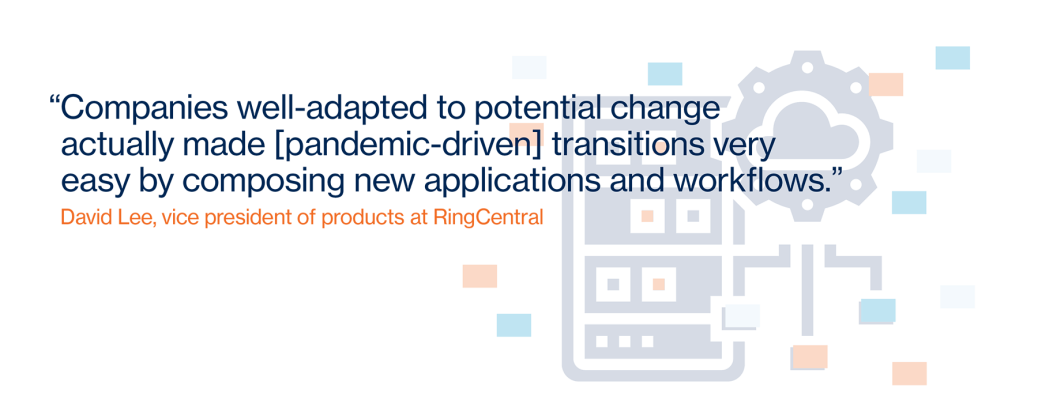Overall, 74% of companies accelerated plans to move to the cloud by more than a year, jettisoning legacy technologies and operating models to embrace data and applications, according to business analysis firm ZK Research.
A key part of that transformation relied on using applications, usually in the cloud, that integrated apps and data with low-code functionality to create more efficient workflows, more quickly than ever. Low-code is a software development approach for building processes and functionality with little or no code, which allows non-software developers to create applications.
Companies that structure daily workflows around these so-called “composable applications”—often called composable enterprises—have a much tighter relationship between technology and business units and can quickly assemble new applications and services at a fraction of the historical cost.
Composable applications provide a way to build on or add to applications in an easy way—think of building blocks: the work has already been done and additional functionality can be added to the foundational ability.
That flexibility is necessary for the variability of the current workplace and economy, says Zeus Kerravala, founder and principal analyst at ZK Research. “We’re moving to an era where in any given moment, you could have everyone in the office, no one in the office, or every reasonable combination in between,” Kerravala says. “You could have all your shoppers online, only a few, or—depending on your industry—no shoppers online and every possible combination between. The pandemic has created these dramatic shifts in the way we learn, the way we live, and the way we work, based on forces that are outside of anyone’s control.”
When it comes to cloud infrastructure, companies have often pursued half measures—adopting it in such a way as to reinforce old business models, creating private clouds that mimic their on-premises infrastructure. But composability gives enterprises the ability to adapt to changes in operations and in their markets by creating new applications to support needed workflows without hiring additional or outside software developers to implement the changes.

Composable cloud services further liberate companies from relying on running their own software instances solely to customize the code to their needs. Composable applications bring together cloud, customization, integration, and workflow management, allowing companies to be flexible and innovate quickly.
When businesses suffered pandemic disruptions to critical business functions—such as call centers, IT support, and medical administration—composable applications allowed firms to adapt and continue. In one case, a company needed to extend its call-center system, which was hosted in a controlled environment, to allow access to employees through web browsers running on an Amazon virtual machine, says David Lee, vice president of products at RingCentral, an enterprise communications platform that has focused on composability. “They had to make these changes work overnight at employees’ homes, and that was a great challenge for a lot of organizations,” Lee says. “Companies well-adapted to potential change actually made these transitions very easy by composing new applications and workflows.”




Recent Comments